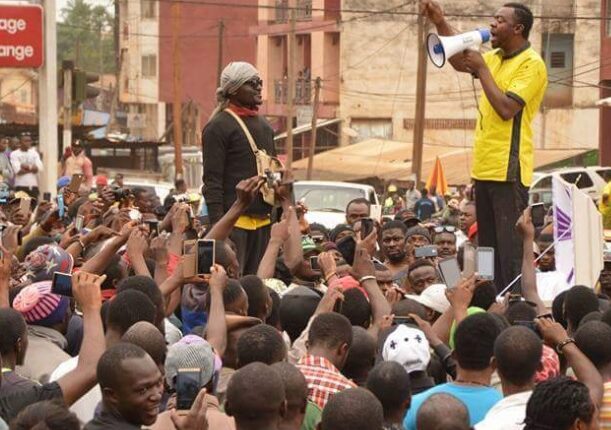Nine years ago, on November 21, 2016, the streets of Bamenda, the heartbeat of the Northern Zone, shook with a bold act that awakened the spirit of Ambazonia. Before the full-blown war, before the burnings, displacements and massacres, one man stood up to the colonial system that had strangled Southern Cameroons for decades. That man was Mancho Bibixy.
For weeks, teachers, common law lawyers and students under the Consortium had grounded the colonial courts and schools, exposing the ongoing Francophonization of Ambazonia. The people had endured enough humiliation, enough erasure, enough occupation.
Then came that morning in Bamenda.
Mancho climbed into a white coffin placed on top of a vehicle and addressed the people. He told them plainly that Ambazonians had been living as the walking dead under colonial oppression and had nothing left to fear. That act was more than a protest. It was a spark.
He became a symbol of courage.
A reminder that a people can rise.
A voice calling Ambazonians to stand like freeborns.
The Coffin Uprising was the turning point. It reignited the national consciousness of Southern Cameroons and pushed Ambazonians to confront the injustice that began with the illegal annexation after 1961.
The colonial regime responded with force and intimidation.
On January 19, 2017, armed colonial forces stormed the house where Mancho was sleeping. They took him without a warrant, without explanation, without letting him take his shoes or documents. They hooded him and whisked him away.
More than a year later, after endless adjournments meant to break his spirit, the Yaoundé colonial military court sentenced him to 15 years. The charges were vague and politically motivated: terrorism, secession, revolution, insurrection, false information, contempt for officials, and hostility against the “fatherland.” Five other Ambazonians were also given long sentences. Only one was released due to a complete lack of evidence.
The court still imposed a crushing fine of over 268 million CFA, plus millions in court costs.
In August 2019, the United Nations Working Group on Arbitrary Detention ruled that Mancho’s arrest and detention were illegal. They called for his immediate release.
La République ignored it.
Today, Mancho remains in Kondengui, held as a political prisoner of conscience. Meanwhile, across the Northern and Southern Zones, Ambazonian Restoration Forces continue to resist colonial occupation. Communities still suffer as the war sparked by the injustice he denounced rages on.
But his voice refuses to die.
The coffin was never about death.
It was a declaration of awakening.
A call to reject colonial domination.
A call to reclaim homeland and dignity.
Nine years later, Ambazonia remembers.
Nine years later, the struggle continues.
By Lucas Muma





